AMASC会長来日歓迎行事報告
2013年3月19日から21日、AMASC会長パメラ・スナイダー(アメリカ)と、オーストラリア聖心同窓会(ASCA)会長でAMASC役員で もあるアン・ド・ブロリオを迎えて、「JASHの日」を中心とした歓迎行事を行いました。パメラは、幼少期を日本で過ごし1986年のAMASC世界大会 がAMASC活動の原点と言う大の親日家です。一方のアンは初来日。異例の早さで咲き始めた桜も、そんなふたりを歓迎しているかのようでした。
≪3月19日(火) 聖心女子学院における「JASHの集い」≫
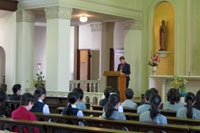
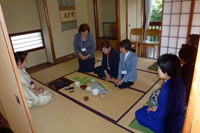
国内7校の代表として聖心女子学院を訪問しました。まず、一連の行事が実り多いものとなるよう、聖堂をお借りして「祈りの集い」を行いました。 生徒たちも加わって、聖書朗読と祈りを捧げ、関幸子(み68、宮37)のオルガン演奏とJASH役員中山宏子(小み44)のアヴェマリア独唱が、おごそかな雰囲気を盛り上げました。その後、JASH理事会の間に、初等科生3名を含む生徒14名が、学校案内と懇談会を行いました。オーケストラ部による音楽演奏、学校生活紹介など充実したプログラムで、将来のJASHやAMASCを担う若者の頼もしい姿に、ふたりは大いに感銘を受けていました。大役を果たしてくれた生徒たち、それを支えてくださった校長様、先生方に心から感謝しております。
ふたりはその後JASH理事会を見学。短時間ではありましたが、整然とした会議の様子に驚いていました。続いて、懐かしいシスター方や、参加して下さった先生、生徒たちも招いての昼食会。更にみこころ会館で茶事を行い、心落ち着くひと時を過ごしました。

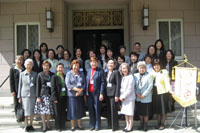
その後は、ビジネスミーティング。世界でも稀な統合同窓会であるAMASCの重要性と言う認識を共有しながら、運営上の見解を異にするJASH とAMASC執行部が、じっくりと互いの意見に耳を傾けました。スナイダー会長が、苦労しながら難しい問題に一つずつ取り組もうとしていることがわかりま した。
≪3月20日(水・祝) 「JASHの日」≫
初めて国民の祝日に行いましたが、出席者は200名を超えました。シスター方、在日AMASC会員の他、折よく来日中のJASH会員であるフィリピン聖心同窓会会長のマリア・エレナ・ラウエル(宮20)も迎えることができました。
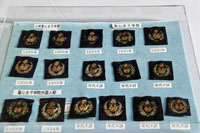 会場の宮代ホール・ロビーでは資料委員会が時間と労力をかけて細心の注意を払いながら準備した資料展示があり、昔を懐かしむ同窓生や聖心の歴史の一端を初めて目にする同窓生などから、様々な感想が聞かれました。
会場の宮代ホール・ロビーでは資料委員会が時間と労力をかけて細心の注意を払いながら準備した資料展示があり、昔を懐かしむ同窓生や聖心の歴史の一端を初めて目にする同窓生などから、様々な感想が聞かれました。
今回の「JASHの日」は、第1部を総会、第2部をスタディグループ中間発表会として、規模を拡大しました。
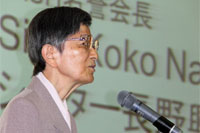
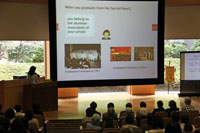
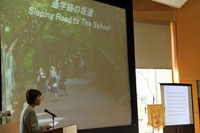
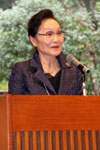
JASH名誉会長聖心会日本管区長シスター長野興子の開会宣言に始まった総会では、スナイダー会長挨拶(全文はこちらから)、 JASH書記によるJASH紹介プレゼンテーションに続いて、委員会、同窓会が工夫を凝らした活動報告を行い、最後にJASH会長の活動報告がありまし た。総会全体を通して、日本の同窓会組織の構造、それぞれの活動の様子や雰囲気、同窓会同士の連携ぶりを、ふたりに理解していただけたことは、よい成果で した。
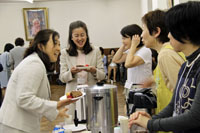
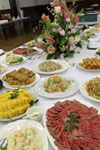
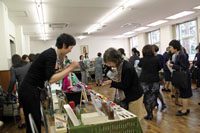
例年のパーラーから広い学生食堂に会場を移した昼食会は、ホスピタリティー委員会が東奔西走して準備した美しい食卓と美味しい料理が、楽しい交流のひとときを演出し、食堂は笑顔でいっぱいでした。同時開催のミニバザーに、初出店の茂仁香会、真理茂会が加わったのも嬉しいことでした。
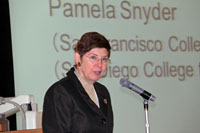
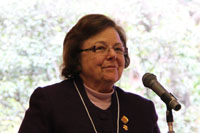
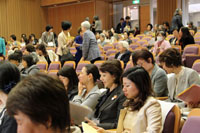
午後のスタディグループ中間発表会では、「心をひとつにして耳を傾けよう」のテーマについてスナイダー会長がスピーチ(全文はこちらから)を、 ド・ブロリオASCA会長が昨年のASCA大会の報告を行いました。そして、ヤングアラムネグループを含む4つのグループの中間報告がありました。どのグ ループも、中間発表とは思えないような内容の濃い発表に、熱心な勉強ぶりがうかがわれ、2014年のアリゾナ大会に向けて今後の展開が期待されます。
今回は、一日を通して海外からの来賓のために、日英の字幕をスクリーンに映写する初の試みをしました。とても難しい仕事で改善の余地がありますが、お蔭さまで大変喜んでいただきました。
≪3月21日 歓迎レセプション≫
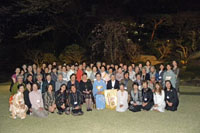
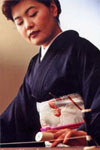
すべての会議を終え、翌21日、皇后陛下御臨席を得て、国際文化会館で歓迎レセプションを開催しました。清虚洞一弦琴宗家四代家元 峯岸一水こと峯岸佐知(み71、宮40)が、珍しい一弦琴の演奏を披露し、その音色は出席者一同の心に深く沁み入りました。最後に、満開の夜桜の庭園で記 念撮影を行い、和やかな雰囲気のうちに閉会となりました。
毎年の「JASHの日」にも増して多数のJASH会員が、影になり日向になり協力を惜しまず、聖心で培ったホスピタリティーの精神をあらゆる場面で存分に発揮したAMASC会長歓迎行事は、こうしてすべて無事終了しました。公式日程のほか、パメラは日本で通った小学校を訪れ、学生時代のルーム メートだった三光会会員との40年ぶりの再会も果たしました。またアンも一緒に美術館巡りや京都観光をして、1週間の日本滞在を満喫し、24日にそれぞれ 日本を離れました。
JASH執行部は7人の小さな組織です。「JASHの日」を初めとする行事は、理事会メンバーやその背後で活躍する委員会委員、同窓会役員やボランティアの力、シスター方、先生方のお支え、そして会員皆さまの出席があって、初めて開催できます。協力してくださったすべての方々に感謝し、今後も聖心の同窓生であることの喜びを皆さまと分かち合っていけますよう、心をひとつにして務めを果たしていきたいとの思いを強くいたしました。
AMASC会長挨拶(JASHの日)
Greetings to you all: Religious Sisters, JASH Officers, and Members of JASH.
My fellow AMASC Administrative Officers, Barb, Maureen and Wendy send you warm greetings from Canada and the United States.
Thank you for inviting me to your annual JASH Day celebration. Today is the 27th anniversary of the last time I was with JASH. Yes, I was one of the lucky people who took part in the AMASC Congress which JASH hosted in 1986. I have clear memories of that Congress which made strong and lasting impressions on me.
Because I have memories and impressions from 1986, I am especially honored that you asked me to join you today. For joining you gives me the opportunity to honor the spirit and the theme of that Congress.
It is not uncommon to remember a big event— all of us remember Conferences and important days such as graduations. My question to you is: do the memories we take away from important days affect our thinking?
There are many fond memories of the Tokyo AMASC Congress. I particularly loved the Ikebana class given by a woman of the Ohara School, and the cherry blossoms which were just beginning to open at the Imperial Palace Gardens, where we were hosted by the then, Crown Princess. Also, there was a magnificent flower arrangement on the altar at St. Mary’s Cathedral for the big Mass.
You may be thinking that my strongest memories are of the honorable traditions of viewing of cherry blossoms and Ikebana…. But that is not correct. The effect of JASH’s AMASC on me was bigger than viewing artfully arranged flowers, however, I did not understand that at the time. Today I know that what affected me the most was the 1986 Congress theme: intergenerational and intercultural dialogue. That theme changed me…once I understood my part, my role.
Working on the study plan before the Congress and then listening to the speakers in Tokyo on the theme of intergenerational and intercultural dialogue awakened me. I learned that I had a role to play in dialogue. Dialogue was not only for diplomats at the United Nations, dialogue was important for every aspect of my life. Over the next years I became alert to and aware of issues, problems and with them, possible solutions by means of dialogue.
Let me explain: what I did not understand in 1986 is that intergenerational dialogue is a necessary first step to intercultural dialogue and intercultural dialogue will contribute to world peace if it is practiced wisely and in a atmosphere of freedom. I know that is a strong statement, but I firmly believe that intercultural dialogue will lead to world peace.
How strongly do I believe in the value of intercultural dialogue? I believe that continuing the process of intercultural dialogue is so important that it caused me to say yes to serving AMASC as President today.
Is AMASC important? Yes, yes, a thousand times yes. AMASC is important because our constituent members, your JASH and my United States AASH, talk together and study together and have fun together at AMASC Congresses. Therefore JASH and AASH contribute to the long process of achieving world peace by remaining in dialogue.
Think of it, you and I are here today because of one woman’s words: St. Madeleine Sophie who said she would have founded the Society… for just one of us…. one of us?you, or you or me. Sophie’s foundation of the Society of the Sacred Heart enables us all to be together today. Sophie began the dialogue and you and I continue it.
Will it take time to achieve perfect dialogue? Yes, dialogue is not the work of a year. Dialogue is a process with rules and wisdom: we are learners. Dialogue takes more than good will, it demands study. And now is where another quotation of St. M. Sophie’s helps me. It was the favorite quotation of Sr. Margaret Connolly, rscj who died recently: “God does not ask of us the perfection of tomorrow or even of tonight, but only of the present moment.” If I believe that… then I will remain in dialogue with you and with others. Because I believe that the perfection of “this moment” is all that is required of me, doing my best right now, then I will keep working for AMASC as I look forward to welcoming you to Arizona in the fall of 2014, where we will work on listening to one another…. another step in dialogue. Listening with one heart, the theme of my mandate… all began in Japan.
AMASC会長スタディ挨拶
Listening Tokyo
Thank you for asking me to share this time with you. The JASH Administrative Officers have asked me to talk with you about the Mandate Theme: Listening with One Heart.
The theme is broken down into three sub-themes: Listening to the needs of others, listening to the cry of the poor and listening to the dialogue between science and religion.
First of all I would like to describe what is known as a “listening process”. This is not my idea, this process has been developed and promoted by an organization called “Just Faith”. At a “Just Faith” meeting, one person reads aloud a letter or a story which was written about the experiences of a person— often a volunteer who has served the poor or the outcasts for some years. The letter describes what the volunteer found, what they tried to do, how they failed, how they succeeded, what they hope to change.
Everyone listens quietly while the letter is read. Then there is silence for up to 5 minutes while people meditate. A tiny bell or chime is rung to bring those present back to attention. The listeners remain silent, but now, if they choose to, a listener will offer a comment or a reaction. The others remain quiet and still. There is never a response to the speaker’s comment. Then there is a minute of silence. The person in charge will ring the bell to signal that another person may comment. This continues until all who wish to comment have done so. Please note that nothing has changed. There is no discussion. There is simply listening to the words of the writer or of the other participants. Why is there no discussion on the comments? Because discussion intimidates some people and keeps them from speaking. The goal is for each of us to become better listeners…. That is all. The process seems simple and of no consequence…. But time after time people are deeply affected.
Now to the theme itself: I’ll start with listening to the cry of the poor. The previous mandate, whose Congress was on the island of Malta in 2010, chose as its theme: Combatting poverty. On Malta the Congress provided good speakers on this world wide everlasting problem. The one negative comment I might make is that we did not have time to digest what the speakers said, to drink from their wisdom. We needed quiet time to reflect on what we had just listened to. Then and only then, would we be able to ask a well founded question.
Before I was elected as AMASC President in Joigny, the birthplace of St. M. Sophie in December 2010, the former officers asked me to continue a variation on their theme of combatting poverty. And so I did choose listening to the cries of the poor, however, I intend the word “poor” in the Biblical sense which encompasses more than financial poverty, not that I would ever minimize that need.
The poor may be a group of people who are normally self-sufficient, but who suffer financially after a hurricane, or an unexpected tragedy. Or the poor may be people who are poor in spirit due to mental or physical illness. Listening to the cry of the poor does not mean that you must fix or repair the lives of the poor. I am suggesting respectful listening. You may be able to help them a lot by simply listening to their stories… you offer a kind ear.
Perhaps their child or spouse is very ill and they feel the need to share their fears. Perhaps there is a child in trouble or a spouse who is in trouble with the police. These can be the most embarrassing moments. We cannot change the situation, however, we can listen and offer our sympathy and respectfully keep their stories confidential.
Sometimes we can change the situation of the poor. We can refer them to an agency or we can help them ourselves. But the most important gift you may offer is to listen to what they ask for.
Many of us choose to support organizations which support those who are financially poor. I know that you in JASH collected great sums of money to help those here in Japan who were affected by the tsunami. This great kindness was announced in a president’s letter— because it is important for other alumnae/I to witness your solidarity with those who were so devastated. You are to be commended.
The second part of the theme, is like the first: listening to the needs of others. Again, this goal is to encourage ourselves to listen with new ears?listen?and not judge. Sometimes we have different needs today than we did yesterday. For example: Today I am in pain?my fingers cannot open the jar. If I share that information with you, will you think I am worthless or too old or too weak? However, If you listen to me you will learn that yesterday I worked too long in the garden and so my hands are stiff today… so, please help me only today. Do not judge me, I am already so embarrassed that I did not step working when it would have been wise to do so. That is what I mean by listening to the needs of others.
When I toured the home of St. M. Sophie the guide explained that the staircase was original to the house, and, that stairs were very unusual in private homes for everyone in that area of France 400 years ago, was expected to climb a ladder?a very tall ladder. The guide told us that St. M. Sophie’s mother often invited older women of the village into her home where she allowed them to climb the stairs, and go into a room and sleep. Were these women poor? No, but they did have a need. They got enough to eat and clothes to wear but they had a need that would be hard to explain in public. Mrs. Barat listened to the conversations of her elderly neighbors and provided them with what she could, privately quietly.
Listening to the dialogue between science and religion: this part of the theme was suggested to me by a Jesuit priest, Father George Coyne, who is the former Head of the Vatican Astronomical Observatory. Father George explained to me that the failure of scientists and religious people to listen to one another is serious problem in the modern world today. Too often each side?the scientists or the religious thinkers, demean or belittle the other side. This may lead to devastating consequences whether in caring for the health of family members or in motivating a population to prepare for climate change. Much of this problem comes from fear and ignorance. Scientists think that their inventions are not respected by those who believe in a Divine Being, and religious leaders often fail to study science so they are suspicious of the sciences and of the message of science. Father George suggests that only by both sides being willing to enter into dialogue with one another can mutual respect develop. While we may not be able to contribute to this dialogue we certainly are able to support it by listening. We may sponsor events where scientists and religious speakers debate, or, we may simply read each side’s comments made about a particular issue. AMASC hopes to have Father Coyne develop this portion of the theme: listening to the dialogue between science and religion at the Congress in Arizona in the fall of 2014.
Thank you.







